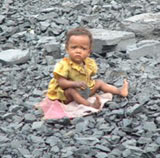On 22 July the World Bank Board discussed the critical Inspection Panel report on the Coal India project in Jharkhand. The report, compiled following an investigation launched on the basis of complaints from local NGOs, concluded that villagers in Jharkhand have suffered harm to their livelihoods as a result of a World Bank-backed coal mining project. Bank staff violated many of the Bank's own policies, including those on resettlement, indigenous peoples, environmental assessment and project supervision.
Earlier Article: Panel finds many faults
 |
![]() Even this 'excuse' ignores concerns about the way these statistics were produced. For example local peoples' use of forest products was overlooked in the baseline surveys. If access to and use of forest products had been considered a part of their livelihood (as they sure were), that would have substantially changed the 'improvement' observed in their conditions. Bank management did concede that the project violated Bank policies on consultation, disclosure and resettlement. Faults were admitted in relation to land compensation, the recognition of traditional land rights, on loss of access to forest products, income restoration schemes and subsistence allowances.
Even this 'excuse' ignores concerns about the way these statistics were produced. For example local peoples' use of forest products was overlooked in the baseline surveys. If access to and use of forest products had been considered a part of their livelihood (as they sure were), that would have substantially changed the 'improvement' observed in their conditions. Bank management did concede that the project violated Bank policies on consultation, disclosure and resettlement. Faults were admitted in relation to land compensation, the recognition of traditional land rights, on loss of access to forest products, income restoration schemes and subsistence allowances.
The Inspection Panel report - a rare thing in itself at the World Bank - and the Bank's response to its findings have brought the validity of this process into question. During its investigation, the panel visited an official resettlement site for people displaced by the coal mines. Locals and supportive NGOs point out that this site contains "a school with no teacher, a health centre with no nurse and a community hall with no community".
Persistent questions about the Bank's committment to the process also result from a lack of transparency. Earlier, the Bank declined to provide a mid-term review of the project for public scrutiny., as "in accordance with the disclosure policy of the World Bank, all documents related to the project and exchanged between the client and the Bank can only be released at the discretion of the client, in this case, the Government of India and Coal India Ltd." This legalese contradicts assurances given to NGOs at the time the project was approved in 1997 that the mid-term review would be a tool for accountability and NGO input.
- Minewatch ![]() Richard Harkinson of Minewatch, a UK-based activist group, has demanded the release of more complete minutes of the Board meeting "to show the details of what remedial action was demanded". He complains that the Bank's Board appears to have accepted the arguments of Bank management too easily and not taken adequate action given the seriousness of the findings by its own Inspection Panel. Minewatch concludes: "without action on mined land reclamation, economic rehabilitation cannot be sustainable and the displaced indigenous people will subsidise the mainstream Indian economy and Bank loan and credit repayments through their involuntary sacrifices".
Richard Harkinson of Minewatch, a UK-based activist group, has demanded the release of more complete minutes of the Board meeting "to show the details of what remedial action was demanded". He complains that the Bank's Board appears to have accepted the arguments of Bank management too easily and not taken adequate action given the seriousness of the findings by its own Inspection Panel. Minewatch concludes: "without action on mined land reclamation, economic rehabilitation cannot be sustainable and the displaced indigenous people will subsidise the mainstream Indian economy and Bank loan and credit repayments through their involuntary sacrifices".























